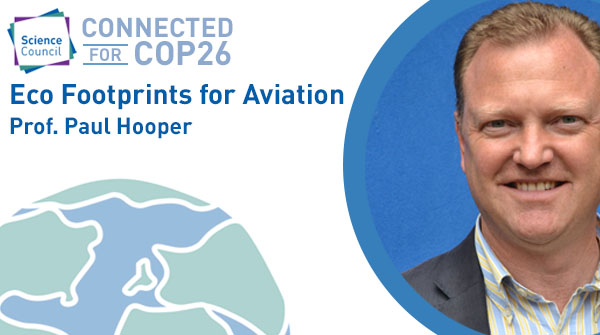
Connected for COP26: ‘Eco-Footprints’ for Aviation
Professor Paul Hooper, Chair in Environmental Management and Sustainability and Professor at Manchester Metropolitan University.
Climate change is a slow and steady process. And so is research impact. When I first started looking at carbon emissions in the aviation sector more than two decades ago I had no sense of how my research evidence might lead to change. But it is exciting – and such a privilege – to now know how my work is influencing significant change across the global sector.
My research on carbon emissions reporting began in the early-2000s. Initially focused on airlines, I identified significant inconsistencies is how operators reported their CO2 emissions. This prevented actors in the sector from making robust, informed assessments or comparisons – and hence limiting actions or policies to improve company environmental performance.
I realised this situation applied as much to airports as aircraft operators and consequently developed with my colleague Professor Callum Thomas an ‘eco footprint’ tool. We worked with Manchester Airport and Airport Footprints Limited, the world’s only specialist airport carbon management consultancy we spun-out from our research. Together we defined an ‘airport system’ for emissions reporting. The study revealed that by focusing only on emissions within their control or ownership (co-called Scope 1 and 2 emissions), the airport operator was likely to report just 5%-10% of overall system emissions. On the basis that you can’t influence or change what you don’t measure, we pushed to include reporting on Scope 3 emissions too: surface access, aircraft, utilities, supply chain and waste. We reported on this project to the European Investment Bank back in 2009.
Since then, our research on airport system emissions has continued largely through commercial contracts with airports to inform carbon reporting and management, although we are about to revisit the subject of Scope 3 emissions reporting, with support from the Airports Council International (ACI). Disappointingly, it seems that airport operators still under report their emissions and align poorly to global reporting standards. By not reporting these significant emissions, understanding the full contribution of airports to climate change is incomplete, as are carbon management plans.
It is through ACI, however, that our research has led to a huge shift in airport approaches to emissions reporting and significant global action around their carbon management. During our work with Manchester Airport, ACI appointed Professor Thomas to an advisory board to advise on the development of the new international Airport Carbon Accreditation (ACA) programme. Our carbon footprinting work directly shaped ACA’s accounting principles and methods, specifically the inclusion of Scope 3 emissions within the scheme. Consequently, all airports accredited at Levels 3/3+ and above must calculate and report Scope 3 emissions.
ACA is the only independent and widely-recognised global carbon management standard for airports and is commended by the United Nations Framework Convention on Climate Change (UNFCCC). Earlier this year ACA reported that 347 airports achieved ACA-accreditation across 76 countries, representing 4.2 billion passengers (nearly half of the global pre-pandemic total). Cumulative CO2 reductions since the accreditation launched in 2009 are 1.7 million tonnes of CO2.
Even more exciting for me is to know that 127 airports have been accredited to Level 3/3+. This means they are engaging with stakeholders across the airport system around Scope 3 emissions. Our latest research, in which Chris Paling and Dr Rachel Dunk have been prominent, led to the launch in November 2020 of Level 4/4+ which take the Scope 3 commitments to another level: not only must airports meet absolute emissions reduction targets, but also develop a Stakeholder Partnership Plans to deliver these reductions across the airport system. I’m delighted that in less than one year six airports have obtained Level 4/4+ accreditation. This is a tremendous achievement for ACA.
Research with a local airport operator has led to global, transformational change that has delivered real world emissions reductions from many operators. It has been slow, steady and much of the on-the-ground activity beyond my control, but I’ve learned that open dialogue and collaboration with influential and ambitious partners really can change the world.
Read the rest of the blog series here.
